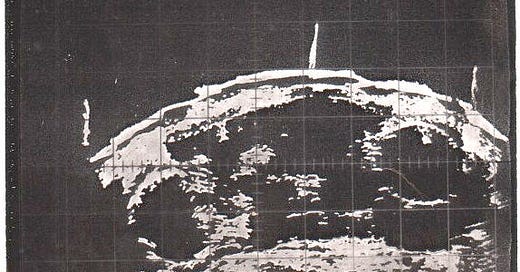My Twin Daughters’ First Baby Picture
Here’s the rule: Call patients and their families when it’s important and when you can. Here’s how I learned that rule.
This picture is of my identical twin daughters in utero. They are the daughters I wrote about in my post of May 17, 2025, the day before they performed at Club Passim in Harvard Square. (1) Their partly calcified craniums are the two white circles at the left and right of the photo. I am not sure which is Christina and which is Meredith. They have always looked the same.
This ultrasound was performed in 1974, when ultrasonography was in its own infancy. This was one of the first ultrasounds performed on a pregnant woman at the Tufts New England Medical Center (TNEMC). The girls were born on May 28 of that year.
1974 was also the year I finished my internship at Tufts. Tufts had an arrangement where first year residents would spend a month in the emergency room at the Maine Medical Center. So, despite my wife Camilla being in her ninth month of pregnancy, I stayed weeknights in resident housing at the Maine Medical Center. Being away from your spouse during the ninth month of pregnancy is unheard of these days, but the twelve men in my residency never thought of changing our rotations for family responsibilities. I’m not proud of that, but it was a different time and it was just not done. Plus, I did not want to ask for the favor because I spent my first month of internship on “injured reserve” because I got hepatitis B from a needle stick from a drug-using patient at Boston City Hospital during my final medicine rotation during my fourth year of medical school. Luckily that was before reports of pneumocystis in gay men heralded the start of the AIDS epidemic. (2)
So, when Camilla went into labor at about 11 pm on May 27, her friends called the Maine Medical Center at about 11:15 PM to tell me to drive the 100 miles to Boston. But I had just finished my emergency room shift at 11 PM and was walking from the hospital to the resident residence. The operator never reached me. Remember, this was way before cellphones. Camilla and her friends did not know that I did not know she was in labor. At about 4 am they called again to ask where I was, and this time the operator reached me in bed in the residents’ residence. I hopped into my car and took off for Boston.
I arrived at the delivery suite at Boston Hospital for Women, now part of Brigham and Women's Hospital, 10 minutes before Meredith was delivered. Unfortunately, Christina, was breach and her delivery was much more difficult. She came out quite blue, I got quite weak and essentially passed out onto a nearby gurney. Christina spent three weeks in the Neonatal Intensive Care Unit. I was released that day.
I spent perhaps two days at home, and then returned to my duties at the Maine Medical Center as required back then. It was the culture of that time. Paternity time off was unheard of. Camilla’s mother came to help her take care of Meredith.
Here is how I learned the rule. While Christina was in the NICU, the attending neonatologist called Camilla early every morning. I remember that his first words were, "Christina is still with us."
I initially took those calls for granted, but as time passed and I understood the effort they took and the comfort they provided, I became so impressed by that neonatologist’s calls that I made the rule, “Call patients and their families when it’s important and if you can.” I try to do it for very sick hospitalized patients, just like that neonatologist did for my family, assuming that I have the correct HIPAA permissions to make the calls.
I also try to do it for other patients if something has gone wrong during the hospitalization or for outpatients when it’s important.. I think this helps head off the second guessing that often occurs after a patient deteriorates. I realize it’s a lot of work, so nurses or medical assistants do some of the calling as well, but when it’s important or needs explanation, I try to make the call. I sometimes make these calls on the way home using hands-free.
Initially, I avoided making such calls, but I have learned how important they are. They show you care, and that you are concerned about the family. They ensure accurate communication, and can be medically useful. I often learn something about hospitalized patients from what the family tells me, and I often learn something from outpatients as well, such as that they really are not taking their meds. These calls to outpatients often speed up the next office visit. Plus, I almost always feel good after making the call, in part because patients and their families seem so grateful.
So, the Rule is, instead of singing the Carly Rae Jepsen hit song, “Call Me Maybe," how about the old Neil Sedaka song, "Just Call Me."
1. https://pauldthompsonmd.substack.com/p/my-first-and-probably-last-advertisement
2. Freidman-Kien A, Laubenstein L, Marmor M, et al. Kaposi's sarcoma and pneumocystis pneumonia among homosexual men — New York City and California. MMWR 1981; 30:305–8.
#medicine #medicalcare #medicaltraining #medicaleducation #patientrelations






Chris: Thank you for your note. Hearing about your Dad actually made me feel better. I was not at the time, but over the years, I have become embarrassed that I almost missed all of my twins' birth. It makes me wonder sometimes how we can criticize so harshly things that happened to ourselves and others in the past. Things and expectations certainly do change. Also, thank you for reading. Paul
Nice.